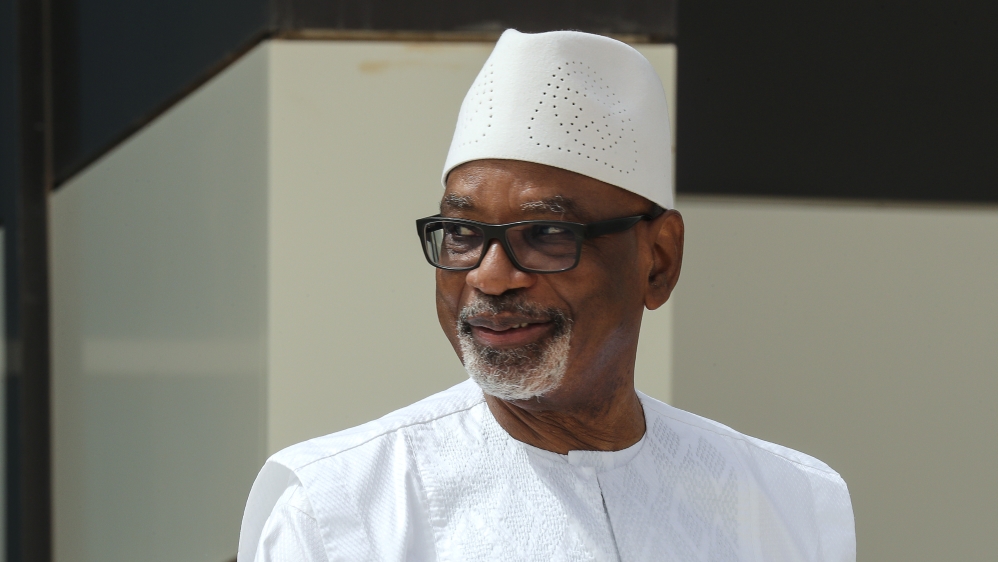Can Malian President Keita survive growing anti-gov’t protests?
Embattled president’s bid to quell dissatisfaction fails to appease opposition coalition, which calls for mass rally.

Ibrahim Boubacar Keita is a man under immense pressure.
For weeks now, the Malian president – widely known by his initials, IBK – has been cornered by a popular protest movement that seems determined to continue taking to the streets until he steps down.
Mobilised by Mahmoud Dicko, a charismatic and hugely influential preacher, tens of thousands of opposition supporters twice last month rallied in the capital, Bamako, to denounce corruption and the government’s handling of a worsening security situation, as well as alleged electoral malpractices and the lack of judicial reform.
Keita, in recent days, has floated a number of moves to quell the growing dissatisfaction, including a promise to reform the country’s Constitutional Court. In April, the court had overturned the results for at least 30 seats in March’s parliamentary election, sparking protests in several cities.
In a televised address to the nation in the early hours of Thursday, the embattled president appeared to go a step further saying he was open to dissolving parliament and holding a fresh vote.
“If peace in Mali depends on it, and that I have the constitutional means to do it without the risk of creating a constitutional vacuum damaging for the whole country, I will do it without hesitation,” said the 75-year-old president, who took office in 2013 and won a second term five years later with a landslide victory.
|
|
But the president’s announcements appear to have had no effect.
“[The] speech completely failed,” wrote on Twitter Moussa Sinko Coulibay, a protest leader, describing it “far from the expectations” of Malians.
As a result, the opposition coalition behind the protests, M5-RFP, is planning to return to the streets on Friday.
“It is difficult to predict what could happen in the coming days. But what is certain is that there is a real social protest to which the government is struggling to respond,” Boubacar Sangare, a researcher at the Institute for Security Studies (ISS) think-tank, told Al Jazeera.
“The opposition demands the resignation of the president and the establishment of a transition. The president proposes a government of national unity and a political pact over three years. The president could gain respite if he managed to make significant concessions to this movement. For the moment, he has instead decided to engage in a showdown,” Sangare said.

Mali cannot afford a prolonged period of political instability.
The gold and cotton-producing country of some 19 million people has been engulfed by conflict since 2012 when an uprising by Tuareg separatists erupted in the north. The rebellion was quickly overtaken by armed groups that have expanded their reach in the wider Sahel region despite the presence of thousands of troops, including international forces.
The escalating violence has spilled into neighbouring Niger and Burkina Faso, with attacks growing fivefold between 2016 and 2020.
As the political wrangling continues in Bamako, fighters are wreaking havoc in central Mali, where some 600 civilians have been killed so far this year in the unrest including armed group attacks and intercommunity violence.
Last week, at least 30 civilians were killed in the Mopti region after unidentified armed men attacked four villages.
On Wednesday, Amnesty International warned the deteriorating security situation could fuel humanitarian disaster.
“A substantial part of the population in central Mali depends on the work done during the rainy season to sustain their livelihood. The failure to protect civilians, including farmers, from these brutal attacks could lead to a humanitarian crisis,” said Ousmane Diallo, Amnesty’s West Africa researcher.
Sangare, the ISS researcher, said Mali is “at a crossroads”.
“The outcome of this crisis will determine the country’s future – at least in the medium term,” he added, pointing to Friday’s rally as an indicator of what could happen next.
“The demonstration planned for July 10 will be a major turning point and will give us more clarity on the options left for the president,” Sangare said.
Follow Hamza Mohamed on Twitter: @Hamza_Africa